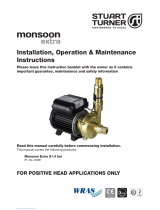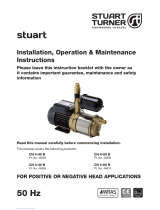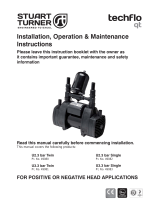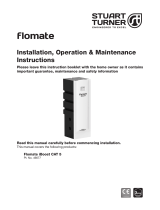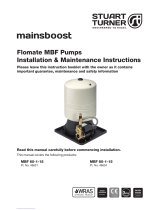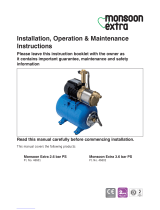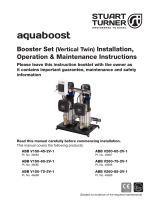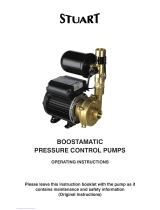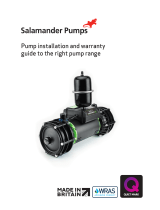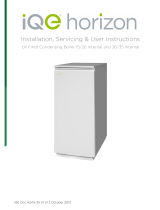Page is loading ...

Installation, Operation & Maintenance
Instructions
Please leave this instruction booklet with the home owner as it contains
important guarantee, maintenance and safety information
Read this manual carefully before commencing installation.
This manual covers the following products:
Showermate S2.6 bar Single
Pt. No. 46429 Pt. No. 46429 EXP
Showermate S2.6 bar Twin
Pt. No. 46431 Pt No. 46431 EXP
Showermate S1.8 bar Twin
Pt. No. 46407 Pt No. 46407 EXP
CE compliant product
FOR POSITIVE HEAD APPLICATIONS ONLY

- 2 -
PRODUCT DESCRIPTION
Electric motor driven single or twin ended peripheral pumps complete with an automatic
control system, consisting of flow switches and electronic controls.
APPLICATION
Showermate pumps are designed for single or multiple (up to 4) outlet pressure boosting
applications, within one bathroom, subject to correct specification and pump sizing in
vented stored water systems. Inlet pressures to the pump and ambient temperatures
must not exceed the values given in the technical specifications.
Showermate Single pumps are not suitable for boosting a single side of a dual flow mixer
valve or tap. Consult Stuart Turner for alternative pump.
zThis pump set must not be used for any other
application without the written consent of Stuart
Turner Limited and in particular must not be
connected directly to the mains water supply.
zThis appliance can be used by children aged
from 8 years and above and persons with reduced
physical, sensory or mental capabilities or lack of
experience and knowledge if they have been given
supervision or instruction concerning use of the
appliance in a safe way and understand the
hazards involved. Children shall not play with the
appliance. Cleaning and user maintenance shall
not be made by children without supervision.
zChildren should be supervised to ensure that they
do not play with the appliance.
Please read installation details carefully as they are intended to ensure this
product provides long, trouble free service. Failure to install the unit in
accordance with the installation instructions will lead to invalidation of the
warranty.
STORAGE
If this product is not to be installed immediately on receipt, ensure that it is stored in a dry,
frost and vibration free location in its original packaging.
CONTENTS Page
Checklist ................................................................3
Important Facts - read before commencing installation ...........................4
Location ................................................................5
Pump Connections ........................................................9
Electrical Installation .......................................................13
Commissioning ...........................................................16
Maintenance .............................................................17
Technical Specication .....................................................18
Trouble Shooting .........................................................20
Guarantee ...............................................................21

- 3 -
CHECKLIST
Your product may vary slightly from the picture above.
The quantities shown above are for twin pumps, (single pumps are shown in brackets).
Item Description Qty Item Description Qty
Pump 1 Anti-vibration feet 4
ISO Hose & integral washer 2(1) Inline strainers (not supplied) 2
Plain Hose & integral washer 2(1)
A
B
C
D
E
Fig. 1
15 mm pipework
22 mm outlet pipework to
shower/bathroom
A
BC
E
C
Twin shown
IMPORTANT: With the pump
removed from its packaging
check for any damage
prior to installation. If any
damage is found contact
Stuart Turner Ltd within
24 hours of receipt.
D

- 4 -
Cont ...
1 IMPOTRANT FACTS: READ BEFORE COMMENCING PUMP INSTALLATION
A. Water storage capacity.
1.11 The hot and cold water storage capacity must be sufficient to meet the flow
rates required by the pumped equipment and any other water using fittings and
appliances, which may be operated simultaneously.
1.12 Ensure the pump is primed as described in the priming section before starting,
damage to the shaft seal will result otherwise. See Section 5 - Commissioning.
B. Water temperature
The water entering the pump must be controlled as follows:
1.13 The maximum allowable water temperature is 65 oC.
1.14 The minimum allowable water temperature is 4 oC.
1.15 DO NOT fit a pump if the hot water is heated via a method whereby the water
temperature cannot be controlled, such as solar or solid fuel you must consult
the PumpAssist team on +44 (0) 800 31 969 80.
C. Minimum Flow
1.16 For this pump to operate correctly there must be a minimum gravity flow of at
least 0.8 l/min through all outlets to be pumped.
D. Pipework - General
1.17 Secure pipework: Ensure pipework to and from pump is independently
supported & clipped to prevent forces being transferred to inlet and outlet
branches of pump.
1.18 Flux: Solder joints must be completed and flux residues removed prior to pump
installation (flux damage will void any warranty).
1.19 Pipework design: Care should be taken in the design of pipework runs to
minimize the risk of air locks e.g. use drawn bends rather than 90o bends.
1.20 DO NOT introduce solder flux to flexible hoses, pumps or pump parts
manufactured from plastic.
1.21 DO NOT allow contact with oil or cellulose based paints, paint thinners or
strippers, acid based descalents or aggressive cleaning agents.
1.22 DO NOT install a non-return valve, or devices which contain non-return
valves, in the suction (inlet) pipework to the pump. The pump must be
free to vent to the supply tank at all times.
1.23 DO NOT bend the flexible hoses beyond 30o. They must be installed as
straight as possible.
1.24 DO NOT connect this pump to the mains water supply.
E. Plumbing Installation Regulations
1.25 The plumbing installation must comply with the current water and building
regulations.
1.26 The plumbing installation must be installed by a qualified person.
1.27 The electrical installation must be carried out in accordance with the current
national electrical regulations.
1.28 The electrical installation must be installed by a qualified person.

- 5 -
Cont ...
2 LOCATION - GENERAL
2.11 Access: For emergencies and maintenance the pump must be
easily accessible.
2.12 Protection: The pump must be located in a dry position, frost free
and protected from freezing, particularly when installed in a loft
(not recommended).
2.13 Ventilation: Ensure an adequate air flow to cool the pump. Separate
the pump from other appliances that generate heat. An 80 mm (3 “)
air gap must be maintained around the pump.
2.14 Safety: The motor casing can become very hot under normal
operating conditions. Care must be taken to ensure it cannot be
touched during operation.
2.15 Water retention: Site the pump in a location where in the unlikely
event of a water leak, any spillage is contained or routed to avoid
electrics or areas sensitive to water damage.
2.16 Static inlet pressure: Before deciding where to locate the unit, check to
ensure the static inlet head between pump and the bottom of the cold water
tank (Figs. 2 & 3), is at least 0.5 metres and does not exceed the max inlet head
of 13 metres.
2.17 Ambient temperature: The pump must be sited in a location where the
maximum ambient temperature does not exceed 40 oC.
2.18 Pipework: For optimum performance pipework MUST be 22 mm.
Pipework should only reduce to 15 mm when entering terminal fitting.
2.19 Noise: If supplied the anti-vibration mounting feet and flexible hoses can be
used to reduce noise transmission, however care must be taken when mounting
the pump that any noise is not amplified through loose panels or pipework.
Do not screw down the pump.
2.20 Direction of flow: Ensure the water flow is in the direction of the arrow that is
marked on the flow switch reed clamp (vertically upwards).
2.21 Flexible hoses: Only use the Stuart Turner hose set supplied with the pump.
2.22 Isolating valves: Separate system isolating valves (non restrictive) must be
fitted to allow easy pump service.
2.23 Inline strainer: You MUST ensure the inlet pipework is fitted with an inline
strainer.
2.24 Preferred pump location: The pump must, for optimum performance, be sited
as close as possible to and never more than 4 metres from the HOT WATER
cylinder. The pump should always be sited BELOW the HOT WATER take-off
from the cylinder. The pump location is also dependent on limitations of
the static inlet and outlet heads of the installation. For guidance on limitations
and recommended location, consult the following relevant section for hot or cold
water installation.

- 6 -
Cont ...
2 LOCATION - SINGLE PUMP
2 LOCATION - TWIN PUMP
Cold water connection:
2.25 The cold water supply: Must be a DEDICATED AIR FREE supply via a tank
connector, and must be positioned at a slightly lower level (25 mm minimum)
than the feed pipe to the hot water cylinder.
Do not connect to the mains.
Twin Pump System
Fig. 3
Max. static inlet pressure 13 m
Outlet head must be
below bottom of cold
water tank and able
to pass a minimum
of 0.8 l/min of gravity
flow
Single Pump System
Fig. 2
Max. static inlet pressure 13 m
Outlet head must be
below bottom of cold
water tank and able
to pass a minimum
of 0.8 l/min of gravity
flow

- 7 -
Cont ...
Hot water connection:
2.26 Hot water cylinder or storage tank: When a hot water cylinder or storage
tank is used, ensure the pipework size from the cold water storage to the hot
water storage is of adequate size and a minimum of 22 mm.
2.27 Hot water supply: The pump must be supplied with a dedicated feed direct
from the hot water cylinder or storage tank, ensuring an air free connection to the
pump. We recommend the use of either the side entry Stuart flange (SE) Part
No 27900 or the top entry Stuart flange (TE) Part No 27800 see Fig. 4.
2.28 Expansion pipe: When the method of connection is to be made via the
expansion pipe, the BASE of the cold water storage tank MUST be at least
1 metre above the connection/take off of the hot water storage cylinder feeding
the pump.
Fig. 4
G 1 Stuart flange
top entry (TE) (Part
No. 27800) with
22 mm pipework
to pump.
Off expansion
pipe with rising
22 mm offset
and 22 mm
pipework to
pump.
Off vertical expansion
pipe with 22 mm
pipework to pump.
Factory installed G ¾
secondary tapping
with 22 mm pipework
to pump.
or
Side mounted Stuart
flange side entry (SE)
(Part No. 27900) with
22 mm pipework to
pump.
30o - 45o

- 8 -
Cont ...
2.29 Non-preferred pump location: If it is necessary to position the Pump above
the secondary tapping on the hot cylinder it is fed by, the risk of introducing air
will be increased.
To avoid this risk one of the two following solutions must be adopted:
The use of a Stuart Top Entry (TE) cylinder flange.
The use of a Stuart Side Entry (SE) cylinder flange, which should have the
addition of an inverted loop (“U” bend) of 350 mm minimum drop before
rising to the pump, located as close as possible to the cylinder wall. This will
ensure the pump receives an air free supply and the cylinder vents any air up the
vent pipe and not the pump feed (Figs. 5 & 6).
Fig. 5 (Twin Pump) Fig. 6 (Single Pump)
Max. static inlet pressure 13 m
Min. static inlet pressure 0.5 m
Max. static inlet pressure 13 m
Min. static inlet pressure 0.5 m
hot water
services
hot water
services
least preferred area
least preferred area
200 mm min
200 mm min
350 mm
min
350 mm
min

- 9 -
Cont ...
3 PUMP CONNECTIONS
zDo not use stainless steel, chrome or nickel plated pipe with
the flexible hose push-in plumbing connections.
zDo not introduce solder flux into the joint or surrounding area
as connectors will be attacked and may fail.
All solder joints should be completed and flux residues removed
before final connection to push-in connections, on the flexible
hose.
zDo not allow contact with oil or cellulose based paints, paint
thinners or strippers, acid based descalents or aggressive
cleaning agents.
zNever operate pump with inlet and/or outlet isolating valves in
the closed position. Damage will occur!
3.11 Pumps supplied with flexible inlet and outlet hoses: The pump inlet and
outlet ports are threaded G ¾ male. These ports are provided with a flat sealing
face suitable for use with an appropriately sized flat faced fitting and fibre or
rubber washer. Ensure a water tight seal is achieved when the pump is both
stationary and running.
a) Hoses incorporating integral isolating
valves should be applied to the inlet
side of pump to satisfy servicing
requirements.
b) Standard hoses with no integral
isolating valve should be applied to
the outlet side of pump.
c) Use correct tool for opening and
closing integrated isolating valve to
prevent damage.
Please note these valves are of quarter turn design, rotate clockwise to close
and anti-clockwise to open. Failure to comply to these instructions could
lead to valve damage.
d) WARNING - pump must not run with valve closed.
e) Flexible hoses with integral isolating valves do not replace system isolation
valves which must be installed.
Open
Close
Fig. 7

- 10 -
Cont ...
3.12 Hose to pump: The pump inlet and outlet ports have fittings which are
specifically designed for connection to the G ¾ female running nuts on the
flexible hoses. The hose end running nut is fitted with a rubber sealing washer
which is held captive within the nut assembly. Locate the hose into position and
screw the nut fully onto the fitting by hand. Finally nip tight with pliers (4 to
5 Nm) for a water tight seal (do not overtighten).
3.13 Hose to pipework:
1. The hoses are fitted with plastic push-in connectors, which must only be
connected with the following:
a) 15 mm diameter copper pipe to BS EN 1057 - R250 (half hard) - Table 3.
b) 15 mm plastic pipe to BS 7291 part 1 and part 2 (Table 1), or part 3
(Table 1) plus internal support sleeve*.
* The internal bore of the plastic pipe must be supported against collapse
with the pipe manufacturers recommended support sleeve (pipe insert).
c) Appropriate plumbing fitting that provides a leak tight connection.
Ensure the pipe is free from all score marks and deformities in the area of the
insertion depth (Fig. 9) and cut the pipe square, removing all burrs and sharp
edges to prevent damage to the sealing ‘O’-ring.
Fig. 8
Flexible hose
G ¾ running nut
assembly
Port fitting
Rubber sealing
washer (captive
in nut assembly)

- 11 -
Cont ...
2. Prior to inserting pipe into fitting, mark the insert depth on the wall of the pipe
with a soft pencil at a distance of 31 mm from the end to be inserted (Fig. 9).
3. Check in the mouth of the fitting that the ‘O’-ring, nylon washer and collet
are in position as shown in Fig. 10.
4. Push the pipe firmly into the fitting, until pencil mark is level with the top
of the collet and the pipe stop resistance is felt. Pull on the pipe to check it is
secure and correctly fitted
5. To release the joint, push pipe firmly into the fitting, hold the collet down and
gently remove pipe. If the system has been filled with water care should be
taken to isolate the pump and towels used to absorb spilled water.
Fig. 10
Collet
Washer
‘O’-Ring
Flexible Hose
Pipe Stop
Fig. 9
15 mm Pipe
Pencil
Mark
Insert Depth
31 mm

- 12 -
Cont ...
If you have any concern either about using push-in fittings or should the
joint leak on final test, isolate the water supplies and contact PumpAssist
on +44 (0) 800 31 969 80.
3.14 Typical Low Level Installation:
In certain installations it may be necessary to install a 90° bend on the inlet or
outlet connections of the pump before the flexible hose to accommodate a low
level installation.
Below are some preferred connection options. All connections seal on the
pump body using a fibre or rubber sealing washer. Tap connector fittings should
be used which must be of an appropriate pressure and temperature rating.
It is essential when using any of the fittings shown below, that a correct
water tight seal is obtained between the pump body and selected fitting and also
the flexible hose and selected fitting. If in doubt contact the fitting manufacturer
and confirm compatibility with the connection to be sealed.
Carefully check connections and pipework for leaks whilst pump running and
stationary before leaving the installation unattended.
G ¾ female x 15 mm
elbow tap connector.
Fibre washer.
15 mm
elbow.
15 mm
copper
pipe
Fibre washer.
G ¾ female x 15 mm
tap connector.
15 mm compression to
G ¾ male.
15 mm copper pipe.
G ¾ female flexible hose
(supplied in kit).
15 mm compression to
G ¾ male. G ¾ female flexible hose
(supplied in kit).
15 mm to G ¾
male.
G ¾ female
flexible hose
(supplied in
kit).
15 mm stem elbow.
G ¾ female x 15 mm tap connector
with flush central spigot and rubber
sealing washer fitted directly to the
pump terminals.
Sealing washer (sometimes
captured in fitting)
G ¾ female x 15 mm
swivel tap connector
with flush central
spigot and rubber
sealing washer fitted
directly to the pump
terminals.
Fig. 11

- 13 -
Cont ...
4 ELECTRICAL INSTALLATION
4.11 Regulations: The electrical installation must be carried out in
accordance with the current national electrical regulations and installed
by a qualified person.
4.12 Safety: In the interests of electrical safety a 30 mA residual current
device (R.C.D. not supplied) should be installed in the supply circuit.
This may be part of a consumer unit or a separate unit.
4.13 Before starting work on the electrical supply ensure power supply is
isolated.
4.14 DO NOT allow the supply cord to contact hot surfaces, including the
motor shell, pump body or pipework. The cord should be safely routed
and secured by cable clips.
4.15 Adjacent pipes: Adjacent suction and delivery pipes should be fitted with
earthing clamps in accordance with current regulations (Fig. 12).
4.16 Earthing: This appliance must be earthed via the supply cord, which must be
correctly connected to the earth point located in the terminal box.
4.17 Pipework: Copper or metallic pipework must have supplementary earth
bonding where the continuity has been broken by flexible hoses or plastic
components.
4.18 Additional earthing: Certain installations may require additional earthing
arrangements such as equipotential bonding. Reference should be made to the
relevant regulations concerning this subject to ensure compliance.
4.19 Connections: The pump must be permanently connected to the fixed wiring of
the mains supply using the factory fitted supply cord, via a double pole switched
fused spur off the ring main and NOT connected to the boiler or the immersion
heater circuits.
4.20 Wiring Of Connection Unit:
WARNING: This appliance must be earthed.
The wires in the mains lead (supply cord) are coloured in accordance with the
following code:
Green and Yellow: Earth Blue: Neutral Brown: Live
As the colours of the wires in the mains lead of this appliance may not
correspond with the coloured markings identifying the terminals in your
connection unit proceed as follows:
Diagram of
earth continuity
connections
Fig. 12

- 14 -
Cont ...
The wire which is coloured green and yellow must be connected to the terminal
in the connection unit which is marked with the letter E or by the earth
symbol: or coloured green or green and yellow.
The wire which is coloured blue must be connected to the terminal which is
marked with the letter N or coloured black.
The wire which is coloured brown must be connected to the terminal which is
marked with the letter L or coloured red.
4.21 Wiring Diagrams:
Model Fuse Size (AMPS)
All Models 5
4.22 Fuses: The following fuse size should be used with the appropriate pump.
4.23 Supply Cord Replacement:
The supply cord and internal wiring within the terminal
box are routed and secured to ensure compliance with the
electrical standard EN 60335-1. It is essential that prior to
any disturbance of this internal wiring, all cable routing and
securing details are carefully noted to ensure re-assembly to
the same factory pattern is always maintained.
If the supply cord is to be changed or is damaged, it must be replaced with a
special cord assembly available from Stuart Turner or one of their approved
repairers.
On disassembly note the cord retention and routing system. Re-assemble to the
same pattern.
For information on cable connection consult the wiring diagram and cable gland
fitting instructions.
FLOWSWITCH
REED (S2)
GREEN / YELLOW
BLUE
BROWN L
LOAD
NS2 S2 L
E
N
S1S1
MAIN WINDING
THERMOTRIP
CAPACITOR
START WINDING
BROWN
BLACK
BLUE
BROWN
230 VAC/1PH/50H
z
SUPPLY
LINK WIRE (BLUE)
BLUE
LINK WIRE (BLUE)
FLOWSWITCH
REED (S2)
GREEN / YELLOW
BLUE
BROWN L
LOAD
NS2 S2 L
E
N
S1S1
FLOWSWITCH
REED (S1)
MAIN WINDING
THERMOTRIP
CAPACITOR
START WINDING
BROWN
BLACK
BLUE
BROWN
BLUE
BROWN
230 VAC/1PH/50H
z
SUPPLY
LINK WIRE (BLUE)
BLUE
LINK WIRE (BLUE)
Single Pumps
Fig. 13
Twin Pumps
Fig. 14

- 15 -
Cont ...
4.24 Cable Gland Fitting Instructions:
To enable correct assembly of the cable gland the ‘O’-ring (Fig. 15 item 1) must
be placed over the cable before the clamping insert (Fig. 15 item 2) can
be tightened.
Note: Cable diameter range:- 6.5 mm to 9.5 mm.
4.25 Supply Cord Extension:
The pumps are fitted with a supply cord to the following specification:-
All models .................HO5VV-F3 G 0.75 mm² - 6 Amp rated cable.
If the supply cord is to be extended, a cord of the same specification should be
used. Any connections or junction boxes used should be specifically suited for
the application and installed in accordance with the manufacturers instructions.
Fig. 15
1
2

- 16 -
Cont ...
5 COMMISSIONING
5.11 System Flushing: This pump incorporates push-in connectors
and plastic components that must not come into contact with
solder flux, acid-based descalents or aggressive cleaning agents.
The pipework system should be flushed out prior to the pump
being connected to ensure any contaminants/chemical residues
and foreign bodies are removed from elsewhere in the system.
5.12 Water Supply: Always ensure that water storage capacity is adequate to meet
the demand. Ensure the pump chamber is full of water before starting the
pump. Failure to do this could result in seal damage. To ensure dry running
does not occur the pump must be primed as described in priming section below.
Do not run pump dry.
5.13 Priming:
Never operate pump with inlet and/or outlet isolating valves in
the closed position. Damage will occur!
The pump must be primed (filled with water) before starting. Turn on water
supply from the system service valves, prime and vent the pump by opening
the pump inlet and outlet isolating valves to allow pump to fill and vent.
In the case of twin pumps, both pump chambers must be independently primed.
5.14 Starting:
a) Ensure the outlet is closed, turn power supply ‘on’.
b) Open and close the outlet in turn associated with the pump, allowing water to
flow from each outlet until all air is purged. As each outlet is opened and
closed, the pump will start and stop respectively.
c) The tap or control valve within the system when opened and closed will now
turn the pump on/off. If this is confirmed to be the case, the system is now
operating correctly.
d) Carefully check pump and pipework for leaks whilst pump running and
stationary before leaving the installation unattended.
5.15 For Further Technical Support: Phone the Stuart Turner PumpAssist team
on +44 (0) 800 31 969 80. Our staff are trained to help and advise you over the
phone.

- 17 -
Cont ...
6 MAINTENANCE
6.11 Turn off water supplies to the pump and release pressure by
opening water outlets before attempting maintenance.
6.12 Water scale: As water is heated scale deposits are released in areas of hard
water, scale can cause the mechanical seal to stick if left without use for long
periods. The pump must be run for at least 5 minutes every four weeks to
“exercise” all working parts. Run on cool water. See Section 7 - Technical
Specification for note on water temperature. This particularly applies to guest
bathrooms used infrequently.
6.13 Cleaners, Disinfectants and Descalents:
Acid based descalents and aggressive cleaning agents must not
come into contact with the pump. The pump must be removed from
the system prior to the use of these products. The system should be
flushed to remove all chemicals before the pump is re-connected.
If in any doubt as to the suitability of the chemical solutions, please
contact our PumpAssist helpline on +44 (0) 800 31 969 80.
6.14 No other routine maintenance is required.

- 18 -
Stuart Turner reserve the right to amend the specification in line with its policy of
continuous development of its products.
Note: For information on other voltages/frequencies which are not shown, consult
PumpAssist on +44 (0) 800 31 969 80.
*Note: The maximum pressure that can be applied to the pump under any
installation conditions.
**Note: A stored water temperature of 60°C is considered sufficient to meet all
normal requirements and will minimize deposition of scale in hard water
areas.
*** Note: Both heads pumping 4.5 l/min and above.
7 TECHNICAL SPECIFICATION
Pump Model S1.8 bar Twin
46407
S2.6 bar Twin
46431
S2.6 bar Single
46429
General Guarantee 3 years
WRAS approval 1709101
Features Pump type Peripheral
Mechanical seal EPDM / PTFE / Al. Oxide
Anti-vibration feet ü ü ü
Flexible hoses 4 4 2
Dry run protection ü ü ü
Materials Pump body Plastic
Impeller Plastic
Performance Maximum head (closed valve) 1.8 bar 2.6 bar
Performance @ 9 l/min 1.5 bar 1.9 bar 1.3 bar
Performance @ 18 l/min 0.8 bar 1.3 bar 0 bar
Maximum flow 33 l/min 36 l/min 18 l/min
Maximum static inlet pressure 13 metres
Maximum working pressure* 380 kPa (3.8 bar)
Maximum ambient air temperature 40 oC
Min / Max water temperature** Min 4 oC / Max 65 oC
Flow switch sensitivity (approx) 0.8 l/min
Connections Pump connections G ¾ male
Flexible hoses Connections (UK model) G ¾ female x 15 mm push-in x 200 mm long, isolating valves on inlet hoses
Motor Type Induction, auto-reset thermal trip
Duty rating Continuous (S1) @ 9 l/min and above *** Continuous (S1) @ 9 l/min
and above
Electrical Power supply / phase / frequency 230 V a.c. / 1 / 50 Hz
Current (full load) 1.8 Amps 2.2 Amps 1.1 Amps
Power consumption 405 Watts 505 Watts 245 Watts
Fuse rating 5 Amps
Power cable (pre-wired) 1.5 metres
Physical Enclosure protection IP22 IP22
Length 304 mm 319 mm 223 mm
Width 132 mm
Height (excluding hoses) 179 mm
Weight (including fittings) 4.7 Kg 5.5 Kg 3.9 Kg

- 20 -
Cont ...
8 TROUBLE SHOOTING GUIDE
Symptoms Probable Cause Recommended Action
Pump will not start. Insufficient gravity flow. Check flow rate minimum of 0.8 l/min required on full hot
and cold.
Electrical. Check power supply.
Check fuse (see fuse section).
Check circuit breaker is set.
Check wiring connections.
Pump jammed. If motor ‘Buzzes’ switch off power and contact Stuart Turner.
Integral motor thermotrip
activated.
Wait for thermotrip to auto-reset and check that duty
point and run time is within specification (see technical
specification).
Reduced/intermittent flow. Incorrect or no anti-aeration
flange fitted.
Check that the installation complies with installation
instructions.
Incorrect pipe sizes. Check for correct pipe sizing, see Page 5 - Section 2.18.
Blocked inlet filters. Clean inlet filters.
Hot water temperature set
to high.
Reduce cylinder stat setting to 65 oC max.
Blocked shower head spray
plate.
Clean in accordance with manufacturers instructions.
No hot water. Air locked water feed. Vent hot water pump of air.
Check cold feed to hot water cylinder.
Check water level in cold water tank and that all stopcocks
and isolating valves are open.
Heating source not operating. Check boiler is switched ‘on’.
Check cylinder thermostat.
Check immersion heater.
Check cylinder contains hot water.
All hot water has been used. Check tank volume is adequate.
Faulty thermostatic mixer valve. Consult makers instructions.
Pump runs on with outlets
closed.
Jammed flow switch. Remove outlet hoses and check that flow switch sits in
lowest position. Check float for free movement.
Damaged reed switch or P.C.B. If pump continues to run, this indicates a closed circuit in
either the flow switch reed or P.C.B. in the terminal box.
Contact Stuart Turner.
Leak in system. Check tap washers, w/c valve washers, pipe joints.
Pump starts with all outlets
closed.
Air in system. Bleed through system without pump running until hot and
cold services run with no air.
Flexible hose leaks Not fitted correctly. Check that the hose is pushed firmly onto the pump inlet/
outlet connections and pipework.
Damaged ‘O’-rings. Check copper pipe ends are cleanly cut and deburred.
8.11 Environment Protection: Your appliance contains valuable materials which
can be recovered or recycled.
At the end of the products’ useful life, please leave it at an appropriate local civic
waste collection point.
/

